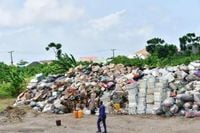Abuja, Nigeria’s bustling capital, faces an imminent sanitation crisis as the Association of FCT Solid Waste and Cleaning Contractors (AFSOWAC) threatens to halt all city cleaning services by September 25, 2025, unless the government settles nine months of unpaid wages. The warning, delivered in a letter dated September 17 and addressed to the Coordinator of the Abuja Metropolitan Management Council (AMMC), has sent ripples of concern through both government offices and the city’s residents, who have already begun to notice the mounting piles of refuse on their streets.
AFSOWAC, representing contractors responsible for cleaning 44 distinct areas—or ‘lots’—within Abuja, says the situation has reached a breaking point. According to News Agency of Nigeria and LEADERSHIP, the group’s more than 3,000 staff members clear over 1,000 tonnes of waste daily using a fleet of more than 100 refuse trucks and 60 tippers. Many of these workers rely solely on their sanitation jobs for their livelihoods, making the ongoing payment delays especially painful.
In their letter, signed by 21 contractors and made available to the press, AFSOWAC detailed the mounting financial hardship faced by its members. The contractors say they have continued to provide essential cleaning services despite high operational costs, including skyrocketing diesel prices, constant equipment maintenance, and the pressure of paying thousands of staff salaries. “Despite our loyalty and sustained service delivery, we have not received payments since January 2025,” the association lamented in their message, as reported by LEADERSHIP.
The financial strain has forced many contractors to borrow from both formal banks and informal lenders just to keep their trucks rolling and their staff paid. But those options, they say, are now exhausted. “We have reached a point where passion and commitment alone cannot sustain this essential service. Without payment, we cannot continue,” AFSOWAC warned, underscoring the gravity of the situation.
The fallout is already visible. Residents have lodged numerous complaints about the growing heaps of uncollected waste in major city centers, a sight that is both unusual and troubling for a city once hailed as one of Africa’s cleanest. According to Abuja Metro, experts have begun to warn of the potential health and environmental impacts if the situation is not addressed quickly. The association further stressed that the city’s reputation is now at risk, with public health and security hanging in the balance.
One particularly sore point is the state of Abuja’s main waste disposal site at Gosa. Contractors described the dumpsite as “deplorable” due to a lack of funds and equipment, calling for immediate intervention to improve both access and the tools available for waste management. The group explained that the poor state of the dumpsite is a direct consequence of the funding shortfall, which has hampered their ability to maintain equipment and purchase necessary supplies.
AFSOWAC’s frustration is compounded by what they see as a lack of communication and action from the relevant authorities. The association specifically called out the Abuja Environmental Protection Board (AEPB), which manages the contracts, for continuing to issue daily directives without addressing the contractors’ financial concerns. “The delayed payments have already led to a buildup of waste in the city, prompting numerous complaints from residents,” the group wrote, expressing their exasperation at being stretched “to the limits.”
Adding to their grievances, AFSOWAC pointed out that the current payment structure is based on outdated rates that do not reflect the present economic realities. They highlighted the impact of recent government policy changes, such as the removal of fuel subsidies and the devaluation of the naira, which have dramatically increased operational costs. The association urged the FCT Administration to expedite a procurement process it initiated in October 2024 to update payment rates in line with these new economic conditions. “Current payments are based on outdated rates that no longer cover operational costs,” AFSOWAC argued.
Despite their ongoing loyalty and efforts to keep Abuja clean, the contractors say they have received neither payment nor any official explanation from the FCT Administration or the AEPB regarding the delays. The association’s letter made it clear that unless the outstanding payments are made by the September 25 deadline, they will be forced—against their will—to suspend all city cleaning services. “We shall, against our will, have to suspend city cleaning services to the FCC,” the letter concluded, urging authorities to act swiftly to prevent a full-blown sanitation crisis.
The potential consequences of such a suspension are dire. Public health officials warn that a breakdown in sanitation services could quickly lead to outbreaks of disease, particularly as uncollected waste attracts pests and contaminates water sources. Security experts also caution that accumulated refuse can create additional hazards, from blocked roads to increased fire risk, further imperiling the city’s residents.
For many of the contractors’ employees, the threat of a work stoppage is more than just a professional concern—it’s a personal crisis. With over 3,000 staff members depending on their salaries to support their families, the lack of payment since January 2025 has already caused significant hardship. “Many of whom rely solely on the job for their livelihood,” LEADERSHIP reported, emphasizing the human cost behind the headlines.
AFSOWAC’s appeal is not merely a call for payment, but a plea for recognition of the essential role sanitation workers play in maintaining the health and image of Nigeria’s capital. The group’s leaders have stressed that they do not wish to disrupt services, but have been left with no alternative by the ongoing financial neglect. “We could no longer guarantee uninterrupted services in the FCT without urgent payment,” they stated in their letter, adding that they have been “overstretched to the limits” for months on end.
The situation has also underscored broader questions about governance and accountability in the capital’s administration. Residents and observers alike are asking why such a critical public service has been allowed to reach the brink of collapse, and whether the authorities will step in before the September 25 deadline passes. As one expert put it, “Abuja’s reputation as one of Africa’s cleanest cities is at risk due to the situation.”
With only days left before the threatened suspension, all eyes are now on the FCT Administration and the Abuja Environmental Protection Board. Will they act in time to avert a sanitation crisis? Or will Abuja’s streets bear the brunt of bureaucratic inaction? For the city’s contractors and residents alike, the coming days will be decisive.
As the deadline looms, Abuja stands at a crossroads—its future cleanliness, public health, and civic pride hanging in the balance.





